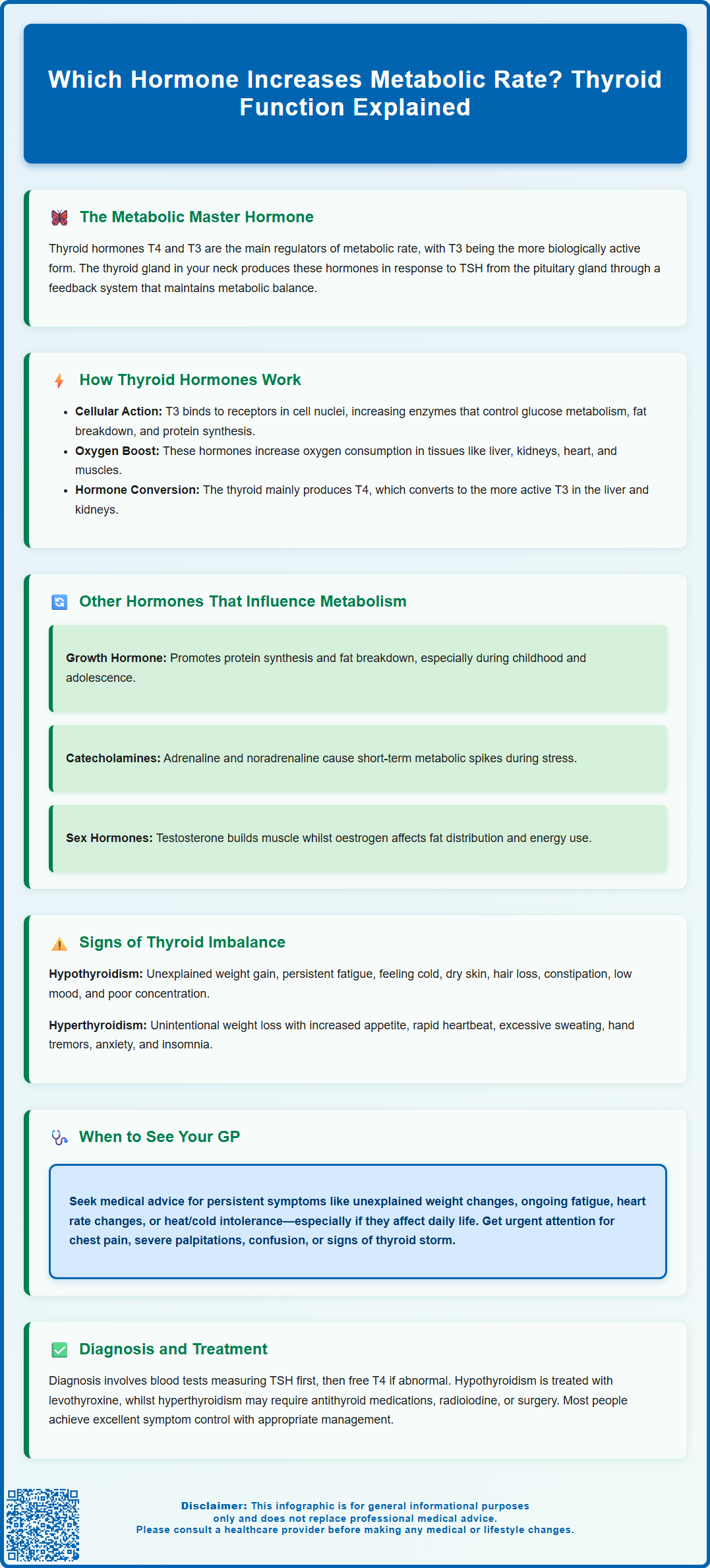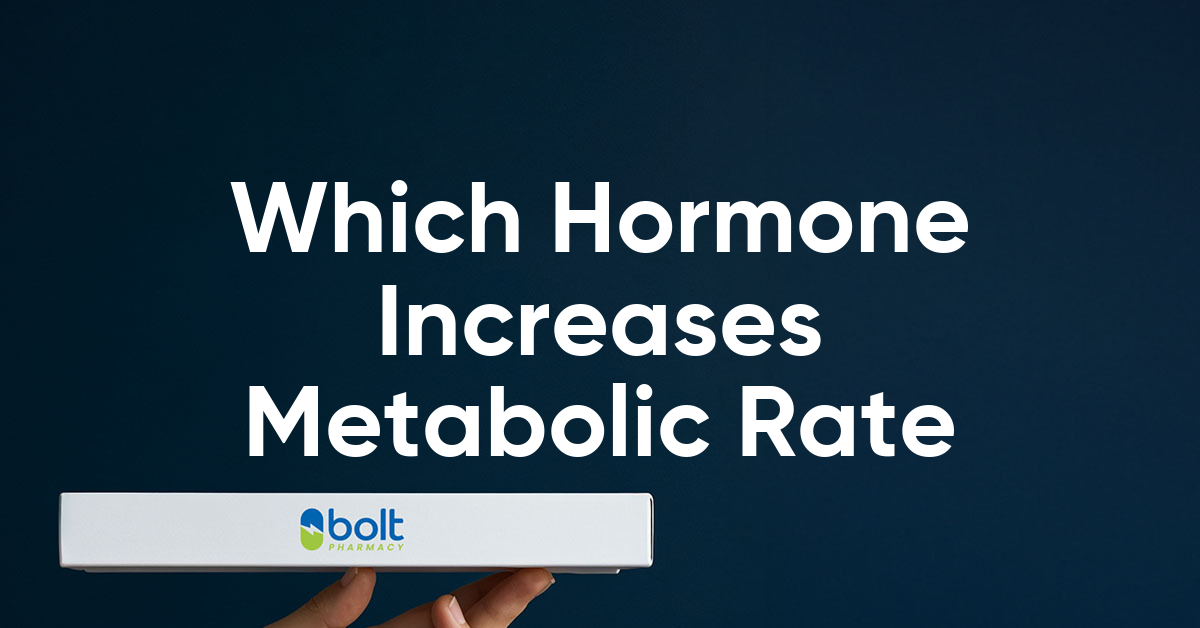Thyroid hormones are the primary regulators of metabolic rate in the human body. Specifically, thyroxine (T4) and triiodothyronine (T3), produced by the thyroid gland, directly control how quickly your cells convert nutrients into energy. T3 is the more biologically active form and has the most significant impact on increasing metabolic rate. These hormones work by entering cells throughout the body and binding to nuclear receptors, influencing gene expression and increasing energy metabolism. Understanding which hormone increases metabolic rate is crucial for recognising when metabolic function may be compromised and requires medical attention.
Summary: Thyroid hormones, specifically triiodothyronine (T3) and thyroxine (T4), are the principal hormones that increase metabolic rate in the human body.
- T3 is the more biologically active thyroid hormone and has the most significant impact on metabolic rate by binding to nuclear receptors and influencing gene expression.
- Thyroid hormones increase oxygen consumption, enhance glucose uptake, stimulate fat breakdown, and elevate heat production in most body tissues.
- The thyroid gland produces these hormones under control of thyroid-stimulating hormone (TSH) from the pituitary gland as part of a feedback system.
- Other hormones including growth hormone, catecholamines, cortisol, and sex hormones also influence metabolic rate but play supporting roles.
- Thyroid dysfunction requires medical assessment through blood tests measuring TSH and thyroid hormones, with treatment typically involving hormone replacement or antithyroid medications.
- Persistent symptoms such as unexplained weight changes, extreme fatigue, or heart rate changes warrant GP evaluation for potential hormonal imbalance.
Table of Contents
Which Hormone Increases Metabolic Rate?
Thyroid hormones are the principal regulators of metabolic rate in the human body. Specifically, thyroxine (T4) and triiodothyronine (T3), produced by the thyroid gland, directly control how quickly your cells convert nutrients into energy. T3 is the more biologically active form and has the most significant impact on increasing metabolic rate.
These hormones work by entering cells throughout the body and binding to nuclear receptors, which then influence gene expression. This process increases the production of proteins involved in energy metabolism, stimulates oxygen consumption, and enhances heat production (thermogenesis). The result is an elevation in your basal metabolic rate—the amount of energy your body uses at rest.
The thyroid gland, a butterfly-shaped organ located in the front of your neck, produces these hormones under the control of thyroid-stimulating hormone (TSH) from the pituitary gland. This forms part of a sophisticated feedback system that maintains metabolic balance. When thyroid hormone levels drop, TSH rises to stimulate more production; when levels are adequate, TSH decreases.
Whilst thyroid hormones are the principal metabolic regulators, it is important to recognise that metabolism is influenced by multiple hormones working in concert. Understanding this relationship is crucial for recognising when metabolic function may be compromised and requires medical attention.
How Thyroid Hormones Control Your Metabolism
Thyroid hormones exert their metabolic effects through several interconnected mechanisms at the cellular level. Once T3 enters a cell, it binds to thyroid hormone receptors in the nucleus, triggering changes in gene transcription. This leads to increased production of enzymes involved in glucose metabolism, fatty acid oxidation, and protein synthesis—all processes that require and generate energy.
Key metabolic actions of thyroid hormones include:
-
Increasing oxygen consumption in most tissues, particularly the liver, kidneys, heart, and skeletal muscle (though some tissues like the brain, spleen and testes are less affected)
-
Enhancing glucose uptake and utilisation by cells, while also increasing hepatic glucose production
-
Stimulating lipolysis (breakdown of fat stores) and increasing free fatty acid availability
-
Promoting protein synthesis whilst also increasing protein breakdown when in excess
-
Elevating heat production (thermogenesis), which is why people with overactive thyroids often feel warm
The thyroid gland produces predominantly T4, which is then converted to the more active T3 in peripheral tissues, particularly the liver and kidneys, by enzymes called deiodinases. A significant proportion of circulating T3 comes from this peripheral conversion rather than direct thyroid secretion. This conversion process allows for fine-tuning of metabolic activity in different tissues.
Thyroid hormones also increase the sensitivity of tissues to catecholamines (such as adrenaline), amplifying their metabolic effects. This explains why individuals with hyperthyroidism may experience symptoms such as rapid heart rate, tremor, and increased sweating. The metabolic rate can substantially increase in severe hyperthyroidism, whilst hypothyroidism can significantly reduce it, demonstrating the profound influence these hormones have on energy expenditure.

Other Hormones That Affect Metabolic Rate
Whilst thyroid hormones are the primary metabolic regulators, several other hormones play important supporting or modulating roles in determining overall metabolic rate.
Growth hormone, secreted by the pituitary gland, has significant metabolic effects, particularly during childhood and adolescence. It promotes protein synthesis, stimulates lipolysis (fat breakdown), and can increase metabolic rate, especially during periods of growth. In adults, growth hormone continues to influence body composition and metabolic function, though its effects are less pronounced than in younger individuals.
Catecholamines (adrenaline and noradrenaline) produce acute increases in metabolic rate as part of the 'fight or flight' response. These hormones increase heart rate, stimulate glycogen breakdown, promote lipolysis, and enhance thermogenesis, particularly in brown adipose tissue. However, their effects are typically short-lived compared to thyroid hormones, and thermogenic effects in adult humans are relatively modest.
Cortisol, the primary stress hormone, has complex metabolic effects. While it can temporarily increase metabolic rate during acute stress, chronic elevation typically reduces lean muscle mass and promotes fat storage, particularly around the abdomen. Cortisol also influences how the body responds to other metabolic hormones.
Sex hormones (testosterone and oestrogen) affect body composition and metabolic rate indirectly. Testosterone promotes muscle mass, which increases basal metabolic rate, whilst oestrogen influences fat distribution and energy expenditure. The decline in these hormones with age contributes to metabolic changes observed in older adults.
Insulin modulates nutrient storage and utilisation in the body. While it plays a crucial role in metabolic health overall, it is not a primary regulator of basal metabolic rate in the same manner as thyroid hormones.
Signs Your Metabolic Hormones May Be Imbalanced
Recognising the signs of thyroid dysfunction or other hormonal disorders affecting metabolism is important for seeking timely medical advice. Symptoms can be subtle initially but may significantly impact quality of life if left unaddressed.
Signs of an underactive thyroid (hypothyroidism) include:
-
Unexplained weight gain despite no change in diet or activity
-
Persistent fatigue and low energy levels
-
Feeling cold, particularly in the hands and feet
-
Dry skin and brittle hair or hair loss
-
Constipation
-
Low mood or depression
-
Cognitive difficulties, including poor concentration and memory
-
Muscle weakness and aches
-
Heavy or irregular menstrual periods in women
Signs of an overactive thyroid (hyperthyroidism) include:
-
Unintentional weight loss despite increased appetite
-
Rapid or irregular heartbeat (palpitations)
-
Feeling excessively warm or sweating more than usual
-
Tremor, particularly in the hands
-
Anxiety, irritability, or nervousness
-
Difficulty sleeping
-
Frequent bowel movements or diarrhoea
-
Muscle weakness
-
Eye problems, including bulging eyes or eye discomfort (in Graves' disease)
It is important to note that these symptoms are non-specific and can occur in various conditions. Many people experience some of these symptoms occasionally without having a hormonal disorder. However, if you experience multiple symptoms persistently, particularly unexplained weight changes, extreme fatigue, or changes in heart rate, it warrants medical evaluation.
Seek urgent medical attention if you notice a rapidly enlarging neck swelling, difficulty breathing, hoarseness or voice changes, or eye pain with visual disturbances.
Other hormonal imbalances may present differently. For example, cortisol excess (Cushing's syndrome) typically causes central weight gain, facial rounding, and easy bruising, whilst growth hormone deficiency in adults may cause increased body fat and reduced muscle mass.
If you are pregnant, planning pregnancy, or have recently given birth, be particularly vigilant about thyroid symptoms, as pregnancy can affect thyroid function.
When to See Your GP About Metabolism Concerns
You should arrange to see your GP if you experience persistent symptoms suggestive of metabolic hormone imbalance, particularly if they are affecting your daily functioning or quality of life. Early assessment and diagnosis can prevent complications and improve outcomes.
Seek medical advice if you experience:
-
Unexplained weight changes (significant gain or loss) over several months
-
Persistent fatigue that does not improve with rest
-
Noticeable changes in heart rate or rhythm
-
Significant changes in bowel habits
-
Mood changes, particularly depression or anxiety that is new or worsening
-
Difficulty tolerating heat or cold
-
Changes in menstrual patterns (women)
-
A family history of thyroid disease, as this increases your risk
-
If you are taking medications known to affect thyroid function (such as amiodarone or lithium)
-
If you are pregnant, planning pregnancy, or have recently given birth
Seek urgent medical attention if you develop severe symptoms such as chest pain, severe palpitations, confusion, hypothermia, or signs of thyroid storm (a rare but life-threatening complication of severe hyperthyroidism characterised by fever, rapid heart rate, and altered consciousness).
Your GP will typically begin with a clinical assessment, including a detailed history and physical examination. According to NICE guidance (NG145), thyroid function should be assessed with blood tests measuring TSH initially. If TSH is abnormal, free T4 will be measured. Free T3 is usually only measured when hyperthyroidism is suspected with a suppressed TSH. In some cases, thyroid antibody tests may be performed, particularly for subclinical hypothyroidism.
If thyroid dysfunction is confirmed, your GP may initiate treatment or refer you to an endocrinologist for specialist management. Treatment for hypothyroidism typically involves levothyroxine replacement therapy, whilst hyperthyroidism may be managed with antithyroid medications, radioiodine treatment (contraindicated in pregnancy), or occasionally surgery, depending on the underlying cause.
Regular monitoring is essential once treatment begins to ensure hormone levels are optimised. Most people with thyroid disorders can achieve excellent symptom control with appropriate treatment, allowing them to maintain normal metabolic function and quality of life.
Frequently Asked Questions
What is the most important hormone for metabolic rate?
Thyroid hormones, particularly triiodothyronine (T3), are the most important hormones for regulating metabolic rate. T3 directly controls how quickly cells convert nutrients into energy by influencing gene expression and increasing oxygen consumption throughout the body.
How do I know if my thyroid hormones are affecting my metabolism?
Signs of thyroid dysfunction include unexplained weight changes, persistent fatigue, feeling excessively cold or warm, changes in heart rate, and alterations in bowel habits. If you experience multiple persistent symptoms, particularly unexplained weight changes or extreme fatigue, you should see your GP for thyroid function testing.
Can other hormones besides thyroid hormones affect metabolic rate?
Yes, several other hormones influence metabolic rate including growth hormone, catecholamines (adrenaline and noradrenaline), cortisol, and sex hormones such as testosterone and oestrogen. However, thyroid hormones remain the primary regulators of basal metabolic rate, with other hormones playing supporting or modulating roles.
The health-related content published on this site is based on credible scientific sources and is periodically reviewed to ensure accuracy and relevance. Although we aim to reflect the most current medical knowledge, the material is meant for general education and awareness only.
The information on this site is not a substitute for professional medical advice. For any health concerns, please speak with a qualified medical professional. By using this information, you acknowledge responsibility for any decisions made and understand we are not liable for any consequences that may result.
Heading 1
Heading 2
Heading 3
Heading 4
Heading 5
Heading 6
Lorem ipsum dolor sit amet, consectetur adipiscing elit, sed do eiusmod tempor incididunt ut labore et dolore magna aliqua. Ut enim ad minim veniam, quis nostrud exercitation ullamco laboris nisi ut aliquip ex ea commodo consequat. Duis aute irure dolor in reprehenderit in voluptate velit esse cillum dolore eu fugiat nulla pariatur.
Block quote
Ordered list
- Item 1
- Item 2
- Item 3
Unordered list
- Item A
- Item B
- Item C
Bold text
Emphasis
Superscript
Subscript












